by Jenny Rose | Jul 5, 2018 | Power
“Always forgive your enemies; nothing annoys them so much.”
― Oscar Wilde
It’s been a chaotic week for me of fear, memories, fire, grief, a couple of new friends and unfinished emotional business resulting in a foul snarl of neglected feelings. Also, in common with millions of others, we are sweltering under a heavy blanket of heat and humidity and I feel about as attractive as a slime mold.
My old home place, my old community in Colorado, is burning. I’m not there. I’m glad I’m not there.
I should be there. I hate myself for not being there.
I’ve written before about blessing the ground between us. Now my mind is filled with the ground I once lived on, and all I can see are the horrifying images of flames, smoke, and the ashy remains of structures and scorched land. I spend hours every day searching the web for updates from local command and incident centers, the local papers, TV and radio and residents who post pictures and videos. I watch interviews with old friends and weep. I see video clips of my town and it’s like a ghost town, the streets empty and everything looking sere and dry because of drought. Towers of smoke loom and the air is an eerie sullen color. This should be the height of the tourist season there, the streets busy, flowers growing, and shade trees green and cool.
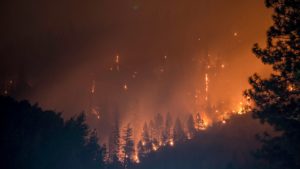
Photo by Matt Howard on Unsplash
Now there are tens of thousands of scorched acres between me and my memories of that place. I bless the ground between us. Given time and water, it will renew, but I think water is no longer a certainty and my lifetime will have run its course before the land recovers and the forests regrow. In a strange sort of way, the desolation of all that scorched earth echoes the desolation I feel as I watch nations, communities, and people become more divisive and competitive. It seems we’re getting more and more skilled all the time at scorching the ground between us, soaking it in blood and then sowing it with salt. We do not forgive differences. We carry hatred between peoples from one generation to the next, and many are at work in the world to increase the divisions by fanning the flames with rhetoric and disinformation, and pouring gasoline onto the fire in the form of resentment, ignorance, and fear.
We do not forgive. We are not forgiven.
Never have despair, powerlessness and fear seemed so darkly seductive to me as they do in these times. My experience is only an infinitesimal part of what’s happening now on Planet Earth, and I’m quite sure we have not yet descended as far as we’re going to. At times, it’s only by deliberately stoking my stubbornness and will and refusing to take my gaze away from where my power is that I continue to cling to faith in some kind of a cosmic balance and plan in spite of fear.
I’ve been spending a lot of time recently thinking about my family and dealing with some of the aforementioned unfinished business. I’ve written letters, both to the dead and to the living, some that have been sent and others that never will be. As I make new friends, I listen to what we talk about, watch how we get to know one another and feel the flowing give and take of compassion and support healthy female friendships create.
“I wondered if that was how forgiveness budded; not with the fanfare of epiphany, but with pain gathering its things, packing up, and slipping away unannounced in the middle of the night.”
― Khaled Hosseini, The Kite Runner
Over and over again, in all these places in my life, I stumble upon the theme forgiveness: The power of it; the terrible, helpless pain of feeling unforgiven; the weapon we make of it; the fear we will not be — cannot be — forgiven for whatever our particular stain or shame is. I have lately asked myself and others: Am I unforgivable? Can that be true? Can love be true without forgiveness? How do I continue to demonstrate love and connection in the face of obdurate unforgiveness? When others told me I was unforgivable, did they mean it, or am I still bleeding over something they have, in fact, forgiven?
It struck me this morning, as I lay in bed at 6:00 a.m. with the rattling roar of the window air conditioner in my ears and the damp sheet over my sweaty body, I’ve once again lost my way, been seduced by the false comfort of victimhood. I’ve been lost in the tangled maze of all those messy feelings and forgotten, temporarily, the point is not what anyone else does about forgiveness. The point is, and the power resides in, what I do with it. Furthermore, the biggest question of all is the one I haven’t been asking.
Can I, do I, will I forgive myself?
That’s where my power is.
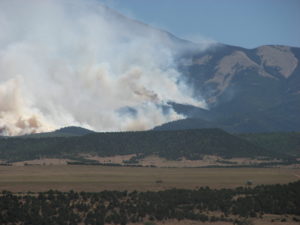
East Peak Fire, Huerfano County, CO 2013
Can I forgive myself for living in this lovely green, lush, landscape where we do still have water? Can I forgive myself for reading the signs of what was to come in the long, unending drought and fires in my old place and leaving before I was forced out by climate change and fire? Can I forgive myself for the mother, daughter and sister I was and am? Can I forgive myself for loving, trusting, hoping, believing, trying, accommodating, pleasing and failing? Can I forgive myself for all the years of neglect, silencing and abuse I colluded with and perpetrated toward myself? Can I forgive myself for now recognizing and responding to my own feelings and needs first? Can I forgive myself for writing or speaking the simple truth?
Forgiveness is a slippery concept, like tolerance. I don’t think of forgiving as forgetting. I’d be foolish to forget what I’ve learned as I interact with others. I’ll cripple myself if I don’t forgive. For me, forgiveness is an integral part of loving. Forgetting is not. Nor do I equate forgiveness with trust. Trust can be lost and rebuilt, but it takes time. Trust depends on forgiveness, but forgiveness doesn’t necessarily include trust.
I’m not at all sure we can create a better world together without forgiveness. I’m quite sure we won’t forgive one another if we’re unable to forgive ourselves. As resources shrink, we’re going to be forced onto a more level playing field in terms of our standard of living. Some of us have a lot more to lose than others. The have-nots are filled with rage. The haves are filled with fear.

Photo by Evan Kirby on Unsplash
There will be a lot to learn in the years ahead. I might as well start now to work with forgiveness, to befriend it, to embrace it, and to talk about it. Forgiving and letting go are both easier for me to do externally than internally, but internal work is the one place where we all have equal power. That’s where it must begin. We’re going to need our power, and we’re going to need to manage it well in order to survive. When our houses, businesses, cars and stuff disappear in fire, storm and flood, when our arable land becomes too hot to grow food, when no water comes from the tap and when money no longer allows us to pretend it’s not all happening, then we will rediscover what true power is, and then perhaps we can begin to bless the ground between us, forgive what has come before, and find new ways to collaborate and cooperate with the living system we call Earth.
In the meantime, I think I’ll stop begging others for forgiveness and concentrate on the places where I have power. Others may think of me as unforgivable, but I needn’t agree, and no one can prevent me from forgiving another.
“The weak can never forgive. Forgiveness is the attribute of the strong.”
― Mahatma Gandhi, All Men are Brothers: Autobiographical Reflections
My road to self-forgiveness may be long. It’s hard to take back the power of forgiveness, because now I have to be responsible for granting or withholding it. In some ways, it’s easier to beg others for it. If it’s not forthcoming from others, well, it’s not my fault. The path of self-forgiveness, though, is all up to me. It will be interesting to discover what sort of shame, guilt and self-loathing lurk in my internal terrain. It will be interesting to challenge the power of what others think and navigate by my own stars and compass. It will be interesting to put out fires on my side and observe whether others are invested in keeping them smoldering or assist in quenching them so the ground between us can heal.
Here’s a poem by Wendell Berry mapping the journey of self-forgiveness. It’s a good map. I’m taking it with me.
Do Not Be Ashamed
You will be walking some night
in the comfortable dark of your yard
and suddenly a great light will shine
round about you, and behind you
will be a wall you never saw before.
It will be clear to you suddenly
that you were about to escape,
and that you are guilty: you misread
the complex instructions, you are not
a member, you lost your card
or never had one. And you will know
that they have been there all along,
their eyes on your letters and books,
their hands in your pockets,
their ears wired to your bed.
Though you have done nothing shameful,
they will want you to be ashamed.
They will want you to kneel and weep
and say you should have been like them.
And once you say you are ashamed,
reading the page they hold out to you,
then such light as you have made
in your history will leave you.
They will no longer need to pursue you.
You will pursue them, begging forgiveness.
They will not forgive you.
There is no power against them.
It is only candor that is aloof from them,
only an inward clarity, unashamed,
that they cannot reach. Be ready.
When their light has picked you out
and their questions are asked, say to them:
“I am not ashamed.” A sure horizon
will come around you. The heron will begin
his evening flight from the hilltop.

Photo by Yuan Yue on Unsplash
All content on this site ©2018
Jennifer Rose
except where otherwise noted
by Jenny Rose | May 31, 2018 | Connection & Community, Emotional Intelligence
A couple of years ago my adult son and I had a heated exchange during which I asked him exactly what he wanted from me. It was a useful question. For a moment we stopped being adversaries while he thought about it. “Umm, I don’t know. What I’ve always had, unconditional love, I guess.”
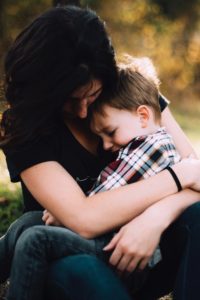
Photo by Jordan Whitt on Unsplash
That moment has stayed with me, because as I asked the question I realized I really didn’t know, and I was both curious and interested. What does a fully emancipated twenty-something-year-old man honestly want from his mother? It was the first time it ever occurred to me to ask either of my sons what they wanted from me at any age or stage.
I never thought of anything except what I wanted to give them.
I’ve been reading about emotional labor recently, which leads me irresistibly to the concept of benign neglect.
Emotional labor is the often invisible process of managing feelings and their expressions as part of a job or relationship. The idea often comes up as part of the ongoing discussion about gender roles and equality, but I’m thinking about it in a slightly different context.
Benign neglect is a term that originated out of city planning politics and now also describes an attitude of inaction regarding an unproductive situation one is commonly held to be responsible for.
I’ve written before about pleasing people, boundaries and reciprocity. Emotional labor is embedded in all of these, and it’s been a primary dysfunction in my relationships over the years, though I haven’t had any language or distinction about my experience of it until recently.
If you Google emotional labor you find definitions, descriptions, assertions about the disproportionate burden of emotional labor on women, and the powerful but invisible expectations regarding who is responsible for emotional labor in any given situation. What you don’t find is discussion about how to make visible and support the vital aspect of emotional labor in community, jobs and families. The discussion stops at equal rights.
Equal rights is an important discussion to have, but in the meantime we’re dealing with families, friends and jobs today and emotional labor is an inescapable need right now.
I think of emotional labor as glue. You don’t see it, but if it’s missing everything falls apart. If it’s applied carefully it holds things together. If we don’t keep a calendar and glance at a clock now and then, we can’t manage our lives. Either we learn to cope with appointments, deadlines, commitments, grocery lists and feelings ourselves or we rely on someone else to do it for us. Part of adulting is learning emotional labor.

Photo by freddie marriage on Unsplash
I’m a button sorter by nature, and I take a lot of pleasure in being organized. My life works better when I take the trouble to be effective and efficient, and it gives me pleasure to share with my loved ones the benefits of thinking and planning ahead and taking care of business. Remembering special dates, buying tickets, planning for bake sales and decorating for the holidays have all been offerings symbolizing my love and willingness to provide support to my family, along with the daily activity of simply showing up in my relationships.
I said that recently to my partner — “this is me showing up in the relationship.” He had no idea what I meant.
I was staggered. What do you mean, what do I mean? You know, asking if you slept well because you didn’t the night before. Or inquiring about the status of that headache you complained about yesterday. Or asking you what’s in your attention and what you’d like to do today. Listening. Sharing. Showing concern. Demonstrating I appreciate you enough to be present. Reminding you that we’re almost out of cat litter. Thanking you for patching the mousehole in the cupboard. Showing up in the relationship!
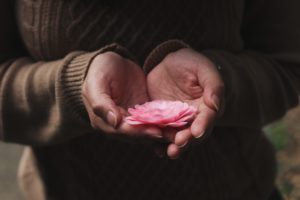
Photo by Ester Marie Doysabas on Unsplash
Yeah. Aka emotional labor.
He listened and shrugged. I didn’t describe anything he could relate to. He lives his life with me without showing up or not showing up. He just does what he does, says what he says, is interested in what he’s interested in. He doesn’t check in with himself every day to be sure he “showed up” in a way that reassures me of his ongoing affection and caring.
I do.
I’ve thought a lot about this since that conversation. I’ve been conscious of a huge annoyance and, underneath that, amusement.
All my emotional labor is completely unneeded. He never asked me to do it. It’s not useful. It’s invisible to him.
This made me wonder if that’s been true in all my other relationships as well, including with my kids, historically and presently.
That’s not right, though, because I’ve been with some real man-babies. My husband once called me at work because the baby had a soiled diaper. (Okay, it was a real blow-out, but still!) Then there was the guy who wanted a dog to fish with, but didn’t want to walk it, poop scoop after it or stay up all night on July Fourth holding its paw because it was terrified of firecrackers and invariably went into seizures (it had epilepsy).
And then there were the kids. There’s no question at all that raising kids takes a lot of emotional labor. It’s both needed and required.

Photo by Chris Barbalis on Unsplash
I guess I just got into the habit. Emotional labor has been my offering, my contribution, in every relationship. I’m good at it. Until very lately, I never considered reciprocity and I had no definition for emotional labor. I just thought of it as being a good woman.
When my son said he wanted what I’d always given, unconditional love, I had a moment of real satisfaction. I made so many mistakes, but at least I did that right. On the other hand, can those two simple words ever encompass the totality of heart, pain, frustration, energy, loyalty and years they represent? Unconditional love. That’s all.
Right.
I was with a man for a long time who had no interest in emotional labor. Once he had me hooked, he was never decisive, confident or clear again. He initiated no physical contact. He resisted making any plans. He made no effort to develop rituals, routines or regular check-ins. His job was stressful, he had some sleep and health issues, and his favorite excuse was “I forgot.” I gave and he withheld.
Eight years later (slow learner) burned-out, anguished and desperate, it occurred to me to wonder what would happen if I. Just. Stopped.
So I did. I stopped e-mailing. I stopped calling. I made plans without him. I let go of all my expectations and started trying to glue myself back together. I worked, took care of my own responsibilities, enjoyed time with friends and family and went on with my life. I set down all that emotional labor and walked away from it.
Guess what happened?
He floated away.
I’d essentially had an eight-year relationship with myself.
He did eventually (weeks) notice I wasn’t around any more and got in touch, mildly puzzled and reproachful. I was casual and said I’d been busy.
He told me he didn’t feel like he was getting the attention he needed from me. We were sitting in his car at the time. I’ll never forget it.
Until now, I’ve never put that experience in context with all my other relationships. After my recent conversation with my partner about showing up in the relationship, I changed my behavior. I stopped worrying about “showing up” every day. I’ve engaged with my own needs, daily tasks and schedule. I enjoy our time together, but I’ve stopped trying to make it happen. I switched my focus to making sure I show up for myself every day.
What I’ve learned from all this is emotional labor is real and largely unconscious. Many of us give our lives to it. I’ve also learned it’s a choice. When it remains invisible and undefined and we’re operating out of unspoken cultural expectations, we become unconscious of much of our decision-making and motivation. Our desire to be a “good” wife, mother, daughter, lover, sister, whatever, becomes all-powerful and we throw ourselves into it without ever thinking about whether that’s what others want and/or need from us. We don’t consider asking for help or professional support if we’re caregivers. In fact, we feel hurt when our emotional labor of worrying, for example, is not received with gratitude and appreciation! If whoever we’re connected with does want our emotional labor and provides none themselves, we don’t notice. We just work harder.
This is where benign neglect comes in. Benign neglect is an attitude of inaction regarding an unproductive situation one is commonly held to be responsible for, remember? The culture may hold us to be responsible for a lot of things, but that doesn’t make it true.
What if we challenged the “commonly held” belief that all emotional labor is our job in any given relationship? What if we decided it’s not our responsibility, in addition to not being useful, to worry, fuss, organize or manage the feelings of the people around us? What if we took back our power to choose?
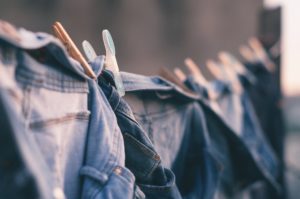
Photo by Bruno Nascimento on Unsplash
If I had stopped worrying about doing laundry for my teenagers, or insisting on family mealtimes, or keeping track of their schedules, what then? The sad truth is I was afraid people would think I was a bad mother. I knew I would think I was a bad mother. The kids didn’t do those things for themselves, so I had to do it in order to demonstrate my love, commitment and competence. What kind of a mother lets her kids wear dirty socks?
I didn’t consider the difference between organizing schedules for toddlers and organizing two big, smart, capable boys who saw no reason to bother themselves with boring things like schedules, grocery lists and clean socks. I was so busy demonstrating my feelings, especially my love for them, I never stopped to wonder if they were learning to express their feelings. I didn’t ask.
It annoys me that only now am I seeing ways in which I could have been a much more effective parent, partner, daughter and sister.
At bottom, I don’t think emotional labor is about equal gender rights at all. I think it’s about choice, and choice is about power. We can’t choose if we don’t recognize there is a choice, we can only stumble forward blindly, doing our best with what we think the rules and expectations are, external and internal, until, overburdened, overwhelmed and exhausted, we fall down and don’t get up again. Meanwhile, the people we love, the ones we’re doing all this labor for, are not saved by our labor. Kids grow up, have car accidents and bad relationships, choose crappy diets, fall into addiction, catch an STD. Parents grow old, have health problems, and become dependent. Siblings, friends, lovers and mates are not assisted by our worry, our ability to manage their feelings or our “showing up” in the relationship. All our loved ones might be a great deal better off if we hadn’t taken on all the emotional labor ourselves, because when life happens, as it inevitably does, they lack the skills we never let them learn because we were so busy being good women.
Also, when was the last time you were thanked for all your emotional labor? (What do you mean, “showing up” in the relationship?)
You gotta love the irony of the whole thing.
What would my relationships look like if I kept my emotional labor in balance with the labor of those I’m connected to? What if I could be more like my partner and trust that my affection and love for him (and others) are communicated and understood without such deliberate emotional labor? He just naturally demonstrates his feelings for me in our day-to-day life without all this effort and trying. What if I relaxed and redefined what being a “good woman” means?
I’m going to find out.

Photo by Ryan Moreno on Unsplash
All content on this site ©2018
Jennifer Rose
except where otherwise noted
by Jenny Rose | May 17, 2018 | Contribution, Emotional Intelligence
The seed for this post was a podcast by Pat McCabe, also known as Woman Stands Shining, who is a Diné (Navajo) mother, grandmother, activist, artist, writer, ceremonial leader and international speaker. In the podcast, she speaks about the idea of making an offering as part of our spiritual work.
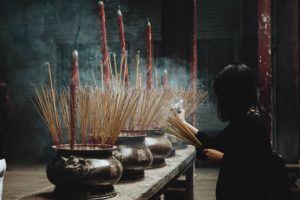
Photo by Chinh Le Duc on Unsplash
That idea started me thinking about offerings, what it means to make one, to whom we make them, and why. Spiritual and sacred practices are a strong theme in my Webbd Wheel series. Mother’s Day has come and gone and Father’s Day is ahead. Many of us mark these days with offerings of some kind. For Earth Day, I joined a small neighborhood group and picked up trash, and I framed that activity as an offering. Yesterday I cleaned up my summer-only dance space and danced there for the first time this season. As so often happens, during that hour of dance this week’s post crystallized.
An offering is “a thing offered as a gift or a contribution” according to a quick Internet search. A gift is “a thing given willingly to someone without payment.”
The act of making an offering is ancient, a practice we began long before we could go out and buy a gift. Various cultures have historically engaged in ritual sacrifice (an act of slaughtering an animal or person or surrendering a possession as an offering to God or to a divine or supernatural figure), an altogether different degree of gift from a cute coffee mug.
I’ve long struggled personally with gift giving. There’s something in me that resents and resists the cultural mandates we’ve created to give gifts of a particular kind on certain occasions or days of the year. It seems to me modern-day gift giving has moved away from making an offering and into a demonstration of possessing money and spending it on some new piece of something, just for the look of the thing. We may feel real love, or gratitude, or whatever, but the only way we know how to express it is by buying a card (never mind the trees) and some kind of a gift.
I know that’s how we do things, but what does it accomplish, aside from contributing to our capitalist economy? Is that what we most want from the people in our lives — more stuff — or is that what we take because we can’t get what we really want? Is a coffee mug all we think we have to offer? Is a coffee mug all we think the other will accept? Are we unable to recognize and cherish an offering unless it comes gift-wrapped?
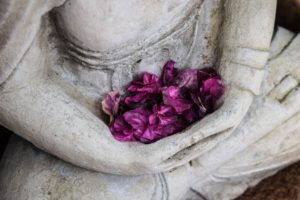
Photo by Chris Ensey on Unsplash
I’m thinking a lot about Pele, the Hawaiian volcano goddess, because I’m writing about her in my second book. Traditional offerings to Pele included tobacco, brandy, silk, crystals, tropical flowers and food. Offerings to Pele and other divine figures around the world involved ritual, prayer, music, song, dance and sometimes a sacrifice. Things, yes, although many were consumables or objects from the natural world, but also time. Presence. Creative, sensual and/or erotic expression. Community celebration, guided by spiritual leaders. Reverence. Appreciation. Gratitude. Acknowledgement of the Divine’s connection to the people and the natural world they inhabited.
Making an offering on this level is a demonstration of commitment and willingness to participate in the complex web of connection between people and nature. It’s a practice, not a one-time event. It’s flexible and not limited to the calendar or the clock. If there’s a community or individual need to speak to the Divine, time is set aside to do so. No money or commerce need be involved, because the offering is of self.
The offering of self, however, is often invisible, especially to our nearest and dearest. It’s so fatally easy to take one another for granted. The very act of feeding those we love is an offering we’ve been making and accepting since humans began. The acts of growing, harvesting, gathering, hunting, sharing and preparing food, absolutely necessary for survival, are almost obscured now by money and time constraints, ecological concerns, health issues, ideology and who does the dishes. Whether we recognize it or not, feeding another person is an offering of life. Parents know making that single offering to just one child, let alone other family members, is a colossal, exhausting, unending task. Yet it’s so often completely invisible, and who has time to enjoy the act of offering food to another (or ourselves, for that matter), or incorporate ritual, play or creativity into our eating? It’s just another chore in our busy days.
So, if our offering is invisible, unrecognized, unappreciated or even rejected in favor of something like a coffee mug, does it mean we’re worth nothing, we are nothing?
Of course not, but it feels that way sometimes, doesn’t it?
Making an offering means letting it go into the world and having faith in its worth. An offering is a gift, and a gift is a thing given willingly, without payment, remember? There isn’t a scorecard. It’s the practice of offering that enriches our spirit, not the outcome. Unfortunately, everything about our modern culture trains us to depend on immediate reinforcement. We’re hooked on likes, claps and our stats. We gloat over the number of our friends, subscribers, comments and shares. Deadliest of all, we compare our popularity and performance with the popularity and performance of others.
What others think about us and how the world perceives us is becoming more important than our own integrity and the authenticity and quality of our offerings. We’re forgetting how to trust and have faith in silence, in invisibility and in not knowing. We’re forgetting our worth is not defined by others.
What about the offerings we make to ourselves? What about our ability to meet our own needs, spiritual, physical, creative and emotional? Do we have any self to give ourselves? Do we tell ourselves there’s no time, no money and no point? Do we tell ourselves whatever our self-expression is, it’s not worth anything, meaning we can’t sell it to someone or no one will approve of it?

Woodshed
I danced yesterday in an old woodshed that was attached to a local one-room schoolhouse more than 100 years ago. It leans and tilts. The roof leaks. The windows and doors aren’t square and the wind blows through gaps. I swept out the winter’s accumulation of mouse and bat droppings, leaves and dirt. It was a warm, sunny day and as I danced I gradually peeled off my clothes until I was naked. The sun came in the west window and made a square on the floor.
I thought of trees and stones offering their bodies to moss and lichen, the earth offering itself to plants, and blossoms offering themselves to sunlight and insects.
I thought of smiling into a stranger’s eyes and complimenting a cashier on the color of her blouse.
I thought of the creators of the music I was dancing to making an offering of their talent, enabling me to offer my dance.
I thought of homes, rooms and gardens I’ve created that are long erased. I thought of people I’ve loved with my whole heart and volunteer work I’ve done. I thought of my partner, who was running an errand in town so I could eat bacon the next morning. I thought of picking up trash on Earth Day and the new trash that’s been thrown out car windows since then, and how futile that makes me feel.
I thought about words, all these words, all these stories and ideas and thoughts in my head that are here and in my books. I thought about all the words written by others I read each day and appreciate and share.
I thought about procreation, the red tide and the milky seed our bodies offer to life, to hope, to continuance. I thought about offerings of tears, of blood, of pain, of rage and of surrender.

Photo by Leon Liu on Unsplash
Offering is a circle. Life offers itself to us, and we can choose to offer ourselves to Life. What better offering can we make than our fully engaged participation and presence with ourselves, our experience and others? Such a gift can’t be bought or sold. It might not feed our fame, popularity or bank account. We probably won’t get validated by statistics or Twitter. Some people may never recognize or value it.
But our self-esteem will bloom. Our joy will increase. Our words and choices will add to the positive energy in the world. We will become self-empowered and spiritually strong and resilient.
I smiled and laughed and shouted as I danced, whirled and stamped and clapped. I offered up my white, winter-tender skin to the sun and air. A mosquito bit me on a knee; a blood offering. No one saw me, except maybe an astonished spider or two. No one cared. It was an offering of self to self, a private thing. It gave me joy. It gave my body a chance to move and be grateful. It fed my creative well.
It was nothing.
It was everything.
It was my offering.
All content on this site ©2018
Jennifer Rose
except where otherwise noted
by Jenny Rose | Mar 22, 2018 | Power
Resilience is “the capacity to recover quickly from difficulties.” (Oxford Dictionaries.) One of the most prevalent difficulties in modern life seems to be the ever-growing cacophony of Those Who Are Offended. I’ve been thinking about this for some time, but last week I read an interview with author Lionel Shriver that brought my own sense of offense to a head. Here’s a quote from that article:

Photo by Syd Wachs on Unsplash
“Shriver … is not the first to argue that the right to give offense is one of the very foundations of freedom of speech. ‘We’re moving in the direction of enshrining the right not to be offended, which is the end of liberty and certainly the end of good books.'”
Oxford Dictionaries defines offense in four ways:
- A breach of law or rule; an illegal act.
- A thing that constitutes a violation of what is judged to be right or natural.
- Annoyance or resentment brought about by a perceived insult to or disregard for oneself or one’s standards or principles.
- The action of attacking someone or something.

Photo by David Beale on Unsplash
The principle of free speech is taking a real battering in the United States. It’s a one-size-fits-all justification for whatever beliefs and ideologies we espouse. Freedom of speech, however, is not absolute. There are limitations around it intended to protect community and individual rights, including the “offense principle,” a restriction based on perceived offense to society. Freedom of speech is a principle that relies on social guidance, which is to say the intelligence and compassion of us, we the people.
This is a problem in a nation where compassion is daily more distorted and taken advantage of and critical thinking and civil discourse are increasingly difficult to come by. Who gets to define “perceived offense to society?”
Everywhere I look, listen and read, I observe people who appear to believe they have a right not to be offended. Freedom of speech grants such people the right to be offensive, as they’re quick to point out, but it’s only a one-way street. Offensive ideas and beliefs are becoming a broad category. Disagreement is offensive (and hateful and bigoted). Certain words, like ‘uterus’ are becoming offensive. Certain pronouns are offensive. Real or perceived exclusion is offensive. A perception of cultural appropriation is offensive. Identity politics of any sort are offensive. Science and evidence-based thinking are offensive. Name any religion or spiritual framework you like — it’s offensive.
When did we become so precious, infantile and entitled that we stopped dealing effectively with being offended?
When did the cancer of selfishness destroy our willingness to consider the needs of those around us?
When were individual distorted perceptions given power over a larger, more common good?
When did disagreement, questions and citing scientific data begin to earn death threats?
Our social, cultural and political landscape is enormously complex, at least at first glance. We’ve become fantastically and gleefully skilled at silencing, deplatforming, invalidating, gaslighting, projection and the fine art of withering contempt. We suffer from an epidemic of what I call Snow White Syndrome. Remember the wretched queen stepmother and her mirror? “Me, me, ME, not you! I’m the fairest, I’m the best, I’m the most victimized, I’m the most downtrodden, I’m the richest, I’m the most offended!”
At first glance, as I said, it’s all so complex. At second glance, it’s all distraction and bullshit. The bottom line is always a power dynamic. Is an individual or group requesting or demanding power-with or power-over?
It really is that simple.
I’m offended every single day. School shooters offend me. Tantruming and pouting politicians offend me. Silencing tactics offend me. Being forced to deal with the sexual fetishes of others offends me. The list goes on and on. You know who’s responsible for dealing with all this offense?
Me.
It’s not your responsibility to refrain from offending me, and it’s not my business to tippy-toe around your delicate sensibilities, either. Many of us try to approach others with kindness and courtesy, but that doesn’t mean we’ll receive either in return. I don’t expect the world to accommodate me. Life is not fair. Equality is an ideal rather than a reality. Inclusivity is not a right.
My rights and needs are as important, but not more important than anyone else’s.

Photo by James Pond on Unsplash
Individuals and groups who lobby to take away the rights of others work from a power-over position. They’re weak and fearful and use violence and intimidation to distract others from their impotence. Individuals and groups who lobby to create more equal power dynamics work from a power-with position. They’re confident and seek authentic connection through information sharing and constructive contribution toward the well-being of all.
Resilience, not priggish rigidity or sheep-like agreement with the prevailing social fashion, always wins the evolutionary jackpot. Resilient life flexes and bends, masters new environments, learns and successfully reproduces, continues. Life that doesn’t dies. Evolution is not personal. It makes no distinctions between a human being and a cockroach. Evolution has a lot of time, millions upon millions of years. The ebb and flow of species on earth is nothing but ripples. Patiently, intelligently, life begins again, over and over, building its complex web.

Photo by Biel Morro on Unsplash
If we can’t figure out how to live in harmony with our bodies, our communities and the earth, we will be deselected. Walking around with a mouth like a pig’s bottom because we’re offended, mutilating and poisoning our bodies, creating sexual pathology that interferes with our ability to reproduce our DNA, wasting our time and energy engaging in idiotic arguments and eradicating education and critical thinking will all lead to deselection, and it should. Such a species is more destructive than constructive to all the other forms of life on this planet.
Difficulties of all kinds are a given. They always have been. Difficulties are the pressures that shape us and make us stronger — or deselect us. If we want to survive, we need to put aside our offended sensibilities and concentrate on the things that contribute to the stuff of life: food, water, shelter, connection, raising healthy children, our physical and mental health and the well-being of Planet Earth. It seems to me that’s enough to be going on with. If we can’t begin to achieve resilience, the debate over who gets to use which bathroom becomes as moot as it is ridiculous.
Resilience can be learned. We foster it by letting go, learning to be wrong, exercising our intelligence, and forming healthy connections so we can learn from one another, figure out how to share power and support one another. Life was never advertised as a free ride. The privilege of life comes with responsibility, demands and competition. Taking offense is not a life skill. Malignant destruction of life, either our own or somebody else’s, is not a life skill. Taking our proper place in the food web and the natural cycles of life and death, on the other hand, is essential if we expect to continue as a species.
Life, in the end, is for those sensible enough to live it, and part of surviving and thriving is resilience. Maybe, if we can get a grip and refocus on what matters, we can learn from the cockroaches, viruses, bacteria, mice, flies, ants, crows, soil organisms and many others that have figured out how to adapt and evolve through every difficulty they encounter.
Offended? Get over it.

Photo by Jonathan Simcoe on Unsplash
All content on this site ©2018
Jennifer Rose
except where otherwise noted
by Jenny Rose | Mar 15, 2018 | Power

Photo by Vladislav M on Unsplash
I’ve always been fascinated by the psychology of survival. I observe that we as a culture are obsessed with heroes and rebels and the endless struggle between archetypal good and evil. Survival kits are becoming a thing in marketing. Preppers write blogs and have TV shows.
Interestingly, our social and cultural world actively inhibits our ability to survive in all kinds of ways. Public school education might be said to be a long indoctrination in anti-survival. We spend hours with our mouths open in front of screens in dark rooms, enchanted by movies and games. Congregations of fans share reverence for comic book characters and the happenings in galaxies far, far away. We debate, criticize and celebrate the way these carefully constructed heroes dress, speak, look, act and collaborate with special effects. We have high expectations of our heroes. We imbue them with nostalgia. We expect our heroes to be just, compassionate, intelligent, interesting, attractive, moral, humorous, strong and poised.
Meanwhile, dangerous events take place in our families; in our workplaces, subways, airports and schools; in our world.
We wait for someone to neutralize the danger, clean it all up, drain the swamp, and make it all fair. We wait for rescue. We turn a blind eye. We do whatever it takes to distract ourselves from uncertainty, fear and our own powerlessness. We watch the beast lumber toward us and deny its presence, deny its existence until we find ourselves in its belly, and then we still refuse to believe.
I’ve been reading author Laurence Gonzales. He’s written several books (see my Bookshelves page). We have Deep Survival and Everyday Survival in our personal collection. Gonzales has made the subject of survival his life’s work. He’s traveled extensively, synthesized studies and research and spent hundreds of hours interviewing people involved with all kinds of catastrophes, both natural and man-made. His books are thoughtful, well-written, extraordinarily well researched and utterly absorbing.
Gonzales uncovers the astounding complexity of human psychology and physiology as he explores why we survive, and why we don’t. He’s discovered some profound and surprising truths.
The best trained, most experienced, best equipped people frequently do not survive things like avalanches, climbing accidents, accidents at sea and being lost in the wilderness. Sometimes the youngest, weakest female has been the sole survivor in scenarios like this. It turns out some of the most important keys to survival appear to be intrinsic to our personalities and functioning, not extrinsic.
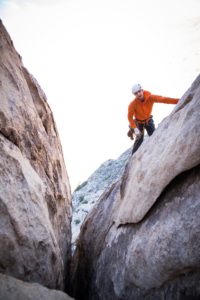
Photo by Tommy Lisbin on Unsplash
Gonzales does not suggest, and nor do I, that training, equipment and experience don’t count, just that they’re not a guarantee. In some cases, our experience and training work against us in a survival situation, because we assume a predictable and familiar outcome in whatever our activity is. We’ve made the climb, hike, journey before, and we did just fine. We’ve mastered the terrain and the necessary skills.
Mt. Saint Helen’s had never erupted before. Therefore, all those people who stood on its flanks and watched in wonder failed to grasp that something new and unprecedented was happening. Their inability to respond appropriately to a rapidly changing context killed them. The same thing happens during tsunamis. People are awed and transfixed. They have no direct experience of a tsunami bearing down on them as the water rolls back to expose the sea bed. They don’t react in time.
There’s a model called the OODA loop. The acronym stands for Observe, Orient, Decide, Act. Our ability to move quickly through the OODA loop is directly linked to our ability to survive.
Observation, the ability to be here now, the ability to recognize what is, is something everybody can practice all the time. No special equipment or training needed. What is needed, though, is the emotional and cognitive willingness (consent, if you will) to set aside our distractions, addictions, rigid preconceptions and expectations (often invisible to us, making them even more deadly) and dependence on stimulation. It also requires a mind set of self-responsibility. It turns out movie theatres, schools, concert venues and many other places are not safe. We can debate, deny and argue; protest and rally; scapegoat and write new laws. We are and we will. In the meantime, the reality is we are increasingly unsafe in many public places, and no one has the power to wave a wand and take care of that for us.
It’s up to us to take care of ourselves. That starts with observation.
In my post on self-defense I mentioned situational awareness. Our instructor emphasized that skill as being more important than any other move or weapon. If we see or sense something dangerous in our vicinity, it’s up to us to orient and move to a safer location.
That brings up another very important survival skill: instinct. At this point science cannot measure instinct, but Gonzales’s instinct about getting on a certain plane saved his life once, and many of us have similar stories. As far as I’m concerned, instinct is part of observation. What do we observe? How do we feel about what we observe?
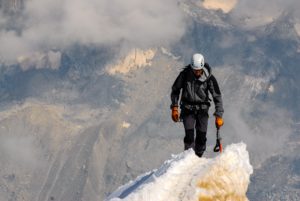
Photo by Wynand van Poortvliet on Unsplash
Our instinct is blunted in all kinds of ways. It’s mixed up with political correctness, including racial profiling. Few of us want to demonstrate discomfort around others for any reason these days. I invariably feel guilty when I react to someone negatively, even if my reaction is entirely private. It’s bad and wrong to judge, to cross the street to avoid somebody. It’s ugly and hateful.
Additionally, I’m a woman and I’m highly sensitive, which makes me particularly attuned to body language, voice inflection and all the clanging (to me) subtext of communication beneath whatever words are spoken. I can’t prove my intuition. I can’t demonstrate it logically. I have no wish to diminish or disempower others. I’m not a bigot. All people have energy and sometimes it’s foul. I reserve the right to move away from it. If that makes me hateful, woo, dramatic or hysterical, so be it. I’m accomplished in the art of noncompliance, but many are not.
If we only see what we expect to see, we aren’t observing. If we fail to see what we’re looking at, we’re not observing. If we can’t take in the whole picture, we’re not observing. If we look for something instead of at everything, we’re not observing. We’ve already broken the OODA loop.
Observing and orienting mean coming to terms with what we see. The plane is down. Our ankle is broken. We’re lost in a whiteout blizzard off the trail. We can’t decide how we’re going to survive if we’re unable to accept and orient to what is.
As a young woman, I did fire and rescue work. I was an IV-certified EMT, and I learned in those days that panic, fear and despair are killers. They’re also highly contagious. People who survive lock those feelings away to deal with after they’re safe again. Gonzales found, amazingly, some people will sit down and die, though they have a tent, food and water in the pack on their back. They just give up.
I also learned that the hysterical victims are not the ones most likely to die in a multiple trauma event. They demand the most attention, certainly, but it’s the quiet ones who are more likely to have life-threatening injury and slip away into death. The screamers and the drunks, the ones blaming, excusing and justifying, are frequently the cause of the accident and retard rather than assist in the survival of themselves and those around them.
On the other hand, strength, determination and calm are also contagious. If just one or two people in a group keep their heads and take the lead, chances for survival begin to increase for everyone.
When I was trained as a lifeguard and swimming teacher, I learned something that’s always stayed with me.
You can’t save some people. It’s possible to find yourself in a situation where, in spite of your training and best efforts, the victim is so combative or uncooperative, or the circumstances so impossible that the choice is between one death or two. This fact touches on my greatest impediment to survival, which, ironically, is also one of my greatest strengths.
My compassion and empathy mean I frequently put the needs of others before my own. I do it willingly, gladly, generously and out of love. It’s one of my favorite things about myself, and it’s also one of my most dangerous behaviors.
Consider a scene many of us are metaphorically familiar with. Someone nearby is drowning. They’re screaming and thrashing, weeping, begging to be saved. We throw them a rope so we can pull them out. They push it away and go on drowning because the rope is the wrong color. Okay, we say, anxious to get it right and stop this terrible tragedy (not to mention the stress-inducing howling). We throw another rope, but this one is the wrong thickness. It, too, is rejected, and the victim, who is remarkably vocal for a drowning victim, continues to scream for help.
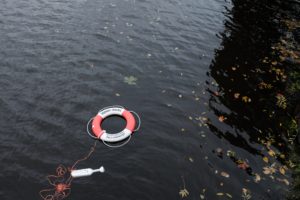
Photo by Lukas Juhas on Unsplash
On it goes, until the rescuer is exhausted, desperate, deafened and feeling more and more like a failure. Meanwhile, the “victim” goes on drowning, loudly, surrounded by various ropes and other lifesaving tools. We, as rescuer, are doing every single thing we can think of, and none of it is acceptable or adequate. In our frantic desire to effect a rescue at the cost of even our own lives, we’ve ceased to observe and orient. We’re not thinking coolly and calmly. We’re completely overwhelmed by our emotional response to someone who claims to want help.
The survivor in this picture, my friends, is not the rescuer. The so-called victim is the one who will survive. If they do grudgingly accept a rope and are successfully pulled out of the water, they immediately jump back in.
The will to survive is an intrinsic thing, and I can’t give or lend mine to someone else. People who can’t contribute to their own survival, and we all know people like that, are certainly not going to contribute to mine, and some will actively and intentionally pull me down with them, just because they can.
I don’t have to let that happen, but in order to avoid it I need to be willing to see clearly, accept what I see, cut my losses and act in my own behalf. Real life is not Hollywood, a comic book or virtual reality. It’s not my responsibility to be a savior, financially, emotionally, sexually or in any other way. The word survivor does not and cannot apply to everyone.
It’s a harsh reality that doesn’t have much to do with being politically correct or approval and popularity, and most people have trouble facing it, which will inhibit their survival if they ever find themselves in an emergency situation.
Gonzales covers this at some length in Deep Survival, and he rightfully points out that compassion and cool or even cold logic are not mutually exclusive. People in extreme situations sometimes have to make dreadful decisions in order to live, and they do. A compassionate nature that does what must be done may buy survival at the cost of life-long trauma. Ask any combat veteran. This is the side of the story the Marvel Universe doesn’t talk about. Survival can be primitive, dirty and gut wrenching. Sending blue light and thoughts and prayers are not the stuff of survival.
Clear orientation leads to options and choices. Evaluating available resources and concentrating on the basics of survival: water, food, shelter, warmth, rest and first aid are essential. Thinking coolly and logically about what must be done and breaking the task into small steps can save people against all odds.
Sometimes, death comes. Eventually, we all reach our last day. In that case, there’s no more to be said. Yet the mysterious terrain on the threshold between life and death is remarkably defining. I wonder if perhaps it’s the place where we learn the most about ourselves.
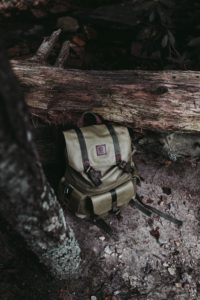
Photo by Andrew Neel on Unsplash
I’ve known people who stockpile weapons and ammo, bury gold in bunkers, build off-grid compounds and obsess about survival equipment and bug-out bags. Many wilderness schools teach basic and advanced survival techniques. Some folks put all their financial resources into prepping for catastrophe and collapse. I’m nervous about the state of the world on many levels myself, so I understand, but I can’t help thinking that investing in a story about living in a guarded, fully-equipped compound is not much better than investing in a story that water will continue to run from faucets, a wall socket will deliver electricity and grocery shelves will hold food, forever and ever, amen.
After reading Gonzales, I’m considering maybe simply living life is the best preparation for survival. Trusting my instinct; learning to manage my power and feelings; being aware of the limitations of my experience, expectations and beliefs are all investments in survival. Simply practicing observation is a powerful advantage. I don’t have money to spend on gear and goodies I might or might not be able to save, salvage or retain if things fall apart. The kind of investment that will keep me alive is learning new skills, staying flexible and adaptive, developing emotional intelligence and nurturing my creativity. No one can take those tools away from me and I can use them in any scenario.
We’re born with nothing but our physical envelope. Ultimately, perhaps the greatest survival tool of all is simply ourselves, our wits and our will.
All content on this site ©2018
Jennifer Rose
except where otherwise noted























